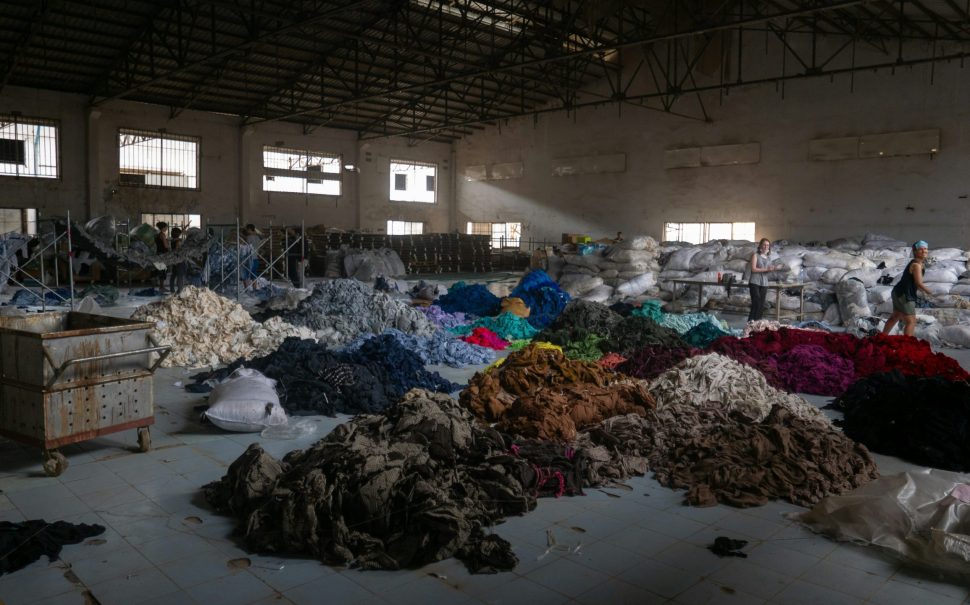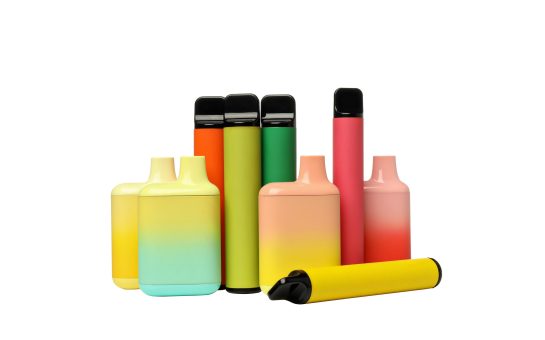As the biggest consumer of fast fashion in Europe, the UK is overly reliant on the use of unsustainable disposal methods such as incineration and offshoring to cope with domestic textile waste, experts say.
Non-governmental organisation WRAP found that 1,450 kilotonnes of post-consumer textiles (ie. textiles that have been purchased and discarded by consumers) were generated in 2022.
Further analysis of the UK’s post-consumer textile market for that year reveals 44% is incinerated with energy recovery, 29% is sent overseas for disposal, 18% is resold into the used clothing market and just 2% is recycled domestically.
Sheffield-based designer, activist and PhD researcher in sustainable fashion Wendy Ward said: “Recycling is often a euphemistic word for destroyed or sent elsewhere.”
In February this year, Ward launched the #TakeItBack campaign to raise awareness on the lack of accountability producers and retailers have for the responsible disposal of their garments at the end of their life-span, by sending used garments to the CEO’s of major retailers asking for guidance on how to dispose of them.
Ward first sent a polycotton bedsheet to the CEO of Sainsbury’s Simon Roberts, pointing out that given the blended synthetic and natural fibre content of the sheet, it could not be composted, and given it’s poor condition could not be donated to charity.
Ward explained that a significant portion of used clothes end up in the general waste stream – 50% of post-consumer waste, according to WRAP’s last Textile Market situation report published in 2024.
These clothes are then either sent to landfill or are increasingly incinerated, due to rising landfilled taxes, where the environmental implications of the mass burning of synthetic fibres are stark.
Incinerating synthetic fibres such as acrylic and polyester, or fabrics that have been treated with dyes or chemicals releases pollutants such as sulfur dioxide and nitrogen oxide into the atmosphere.
It could be argued that responsibility also lies with the consumer to not discard used clothes with their general household waste, but Ward highlights that the alternative of donating clothes to charity shops or sending used textiles to textile sorters, is often not as sustainable as the general public believes it to be.
This is because offshoring, a strategy by which used clothes and textiles are diverted overseas for disposal, is frequently used in the UK to handle post-consumer waste.
Of the 421 kilotonnes of used textiles that were exported overseas, 12% was sent to Ghana and Pakistan respectively.
Ward refers to the practice of overshoring as ‘waste-colonialism’, adding:
“The end of life processing clothes is increasingly becoming as exploitative and opaque as the production of clothes.
“At either end of the life of a piece of fashion, the ‘dirty’ work is being done in the Global South in questionable conditions causing social and environmental harm.”
In June, Green Peace’s UK investigative journalism project Unearthed claimed that clothes from British brands Next, Marks and Spencer and Asda had been found at dump sites situated on protected wetlands close to Ghana’s capital city, Accra.
With Greenpeace Africa finding that the majority of clothing at the dump being made from synthetic, fossil-fuel based fibres which will release microplastics and chemicals into the surrounding habitat as they decompose over hundreds of years, threatening the wetland’s biodiversity.
According to UN data, the UK sent 57,000 tonnes of fashion waste to Ghana in 2024.
Laura Burley, Plastic Lead at Green Peace UK said that this discovery was indicative of the UK and the Global North’s lack of infrastructure to safely dispose or recycle discarded clothing despite the prominence of ‘take back’ schemes implemented by brands to encourage a more sustainable and circular approach to the clothing industry.
Burley said: “The reality is that due to a glut of unsold second-hand clothing and inadequate business models for recycling, discarded textiles are unlikely to be reused or recycled.”
All three British retailers told Unearthed that they did not send clothing to Ghana, or abroad.
Burley further explained that estimating the true extent of used clothing being dumped in Ghana was further complicated by smuggling and illegal trade practices, with ‘textile waste’ ie unusable clothing, often being misclassified as ‘used clothes’ in order to avoid the extra regulations associated with waste exports, and therefore expediting the process of ‘offshoring’.
Burley advocates for fast fashion as an industry to move towards a circular fashion model, where there are provisions for textile waste to be repurposed and clothes are not only made from durable materials but can be mended also, in order to curtail the number of fast fashion items bloating global post-consumer waste.
However, she added: “Companies whose business model is based on producing ever more cheap throwaway items, cannot be trusted to make and honour commitments on reducing the volume of clothes they sell, or on how much plastic they use to produce the clothes.”
She called for a legally-binding Global Plastics Treaty to limit worldwide production of plastic as well as global, national and regional agreements on Extended Producer Responsibility (EPR) for textiles.
Such policies would hold producers to account, either financially or physically, for the treatment or disposal of their products with the intention that producers would be incentivised to reduce waste at source and improve recycling infrastructure in the UK.
The 2019 Environmental Audit Committee Report called on the UK government to take action on developing an Extended Producer Responsibility policy for the textile sector – this has yet to be implemented.
The Department for Environment, Food and Social Affairs (DEFRA) has convened a Circular Economy taskforce with the goal of helping develop a Circular Economy Strategy for England by focusing on the UK sectors with the greatest potential to grow the economy: textiles; chemicals and plastics; construction; transport; and agrifood.
They plan to publish the strategy in the coming autumn.
A DEFRA spokesperson said: “Our Plan for Change is focused on cleaning up Britain and ensuring that the £4.5bn worth of clothes we currently throw away are kept in use for longer.
“Fashion should not come at the cost of our natural environment and textiles is one sector where our Circular Economy Taskforce aims to end our throwaway society for good.”
Though, evidence of the environmental toll of the UK’s struggling resources to deal with post-consumer waste is sobering, ‘Project Re:claim’, a joint project by recycling specialist Project Plan B and The Salvation Army Trading Company shows a step in the direction of a circular economy for the UK’s textile sector.
In a pioneering world first, Project Re:claim reprocesses polyester fibres into granules that can be repurposed to create new clothing, a technology which has the potential to transform the UK’s approach to disposing of synthetic fibres if made commercially viable. Both the Salvation Army Trading Company and Project Plan B were contacted for comment.
*WRAP Textile Market Situation 2024 Report analyses data from 2022.
Featured Image Credit: Francois Le Nyugen on Unsplash




